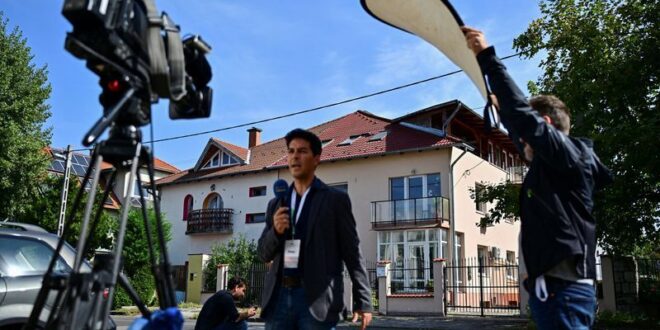BUDAPEST (Reuters) – She speaks seven languages, has a PhD in particle physics, an apartment in Budapest plastered with her own pastel drawings of nudes, and a career that took her around Africa and Europe doing humanitarian work.
What Cristiana Barsony-Arcidiacono, 49, the Italian-Hungarian CEO and owner of Hungary-based BAC Consulting, says she hasn’t done is make the exploding pagers that killed 12 people and wounded more than 2,000 in Lebanon this week.
After her company was revealed to have licensed the design for the pagers from their original Taiwanese manufacturer Gold Apollo, Barsony-Arcidiacono told NBC News that she didn’t make them.
“I am just the intermediate. I think you got it wrong,” she said.
Since then, she has not appeared in public. Neighbours say they haven’t seen her. She did not respond to messages seeking comment. Her flat in a stately old Budapest building, where a door to a vestibule had been open earlier in the week, has been shuttered.
Discussions with acquaintances and former work colleagues paint a picture of a woman with an impressive intellect, but a peripatetic career in a string of short-term jobs in which she never quite settled down, despite embellishing her CV along the way.
An acquaintance of hers, who like others who knew her socially in Budapest asked not to be identified, said she seemed like someone who “could easily be used”.
“Good-willed, not a business type, more like someone who often tries something new, who quickly believes things and then gets enthusiastic about that,” the person said, adding that Barsony-Arcidiacono had been looking for income as she wanted to leave another job.
‘ONE OF THE BIGGEST MISTAKES OF MY LIFE’
Kilian Kleinschmidt, a veteran ex-U.N. humanitarian administrator who hired Barsony-Arcidiacono in 2019 to run a six-month Dutch-funded programme to train Libyans in Tunisia in subjects such as hydroponics, IT and business development, described her as a “bullying” manager, and said he released her before her contract was over.
“Cristiana. That was one of the biggest mistakes of my life, I think,” Kleinschmidt told Reuters. “It was simply awful on a personal level… Then at some point I said enough is enough. I should probably have done it sooner. I said that’s enough and I sent her home a month early.”
Barsony-Arcidiacono has not responded to Reuters calls and emails and there was no answer when Reuters visited her private address in downtown Budapest.
At her Budapest home, a steel outer gate encloses a small vestibule where life drawings of nudes sketched in red and orange pastels can be seen taped up on the wall. An inner door leading into her apartment was ajar when Reuters first visited the building on Wednesday, and closed when the reporter returned on Thursday. No one answered the bell.
A woman living in the building for the past two years said Barsony-Arcidiacono was already a resident when she moved in, and described her as kind, not loud, but communicative.
She practiced her drawing as part of a Budapest art club, though she hadn’t attended for a couple of years, said the organiser of the group, who said she seemed like more of a businesswoman than an artist but was upbeat and outgoing.
A school mate of Barsony-Arcidiacono said she grew up in a family with a working father and housewife mother in Santa Venerina, near Catania in eastern Sicily, and attended high school nearby. He described her as a quite reserved youngster.
In the early 2000s she earned her PhD in physics at University College London, where her dissertation on positrons – a subatomic particle with the mass of an electron and a positive charge – remains available on the UCL website. But she appears to have left without pursuing a scientific career.
“As far as I know she has not done scientific work since then,” Akos Torok, a retired physicists who was one of her professors at UCL and published papers with her at the time, told Reuters by email.
A resume she used to get the job working for Kleinschmidt included references to other post-graduate degrees, in politics and development, from the London School of Economics and the School of Oriental and African Studies, which Reuters was not able to verify. She then went on to describe a string of jobs working on NGO projects in Europe, Africa and the Middle East.
In a separate CV on the BAC Consulting website, she described herself as a “Board Member at the Earth Child Institute”, an educational and environmental charity in New York. The group’s founder, Donna Goodman, told Reuters Barsony-Arcidiacono had never held any role there.
“She was a friend of a friend of a board member, and contacted us about a job opening” in 2018, Goodman said. “But she was never invited to apply.”
That CV also described her as a former “Project Manager” at the International Atomic Energy Agency in 2008-2009, who organised a nuclear research conference. The IAEA said its records indicated she had been an intern there for eight months.
On BAC Consulting’s website, which was taken down by the end of this week, the company gave little idea of its actual business in Hungary. Its registered address is a serviced office in a Budapest suburb.
“I am a scientist using my very diverse background to work on interdisciplinary projects for strategic decision-making(water & climate policy, investments),” Barsony-Arcidiacono wrote on her CV.
“With excellent analytical, language, and interpersonal skills, I enjoy working and leading in a multicultural environment where diversity, integrity, and humour are valued.”
(Reporting by Krisztina Than in Budapest; Additional reporting by Francois Murphy in Vienna, Catarina Demony in London, Giselda Vagnoni in Rome, Johan Ahlander in Stockholm, David Guathier-Villars in Istanbul, Laila Bassam in Beirut, Nerijus Adomaitis in Oslo, James Pearson in London, and Marine Strauss in Brussels; Writing by Niklas Pollard; Editing by James Pearson and Peter Graff)
 BeritaKini.biz Berita Viral Terkini di Malaysia
BeritaKini.biz Berita Viral Terkini di Malaysia





